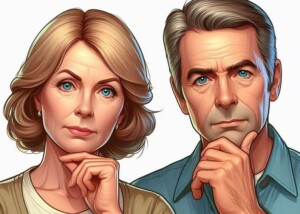At the event a woman with a toddler who didn’t know I’m autistic told me, “When my son was diagnosed with autism I was sad.”
Here’s how I responded.
Every Fourth of July the retail store, that caters to the autism community, holds an event in their giant back lot from 7:30-10 pm.
- Free grilled hotdogs
- Free potato salad, coleslaw, munchies, watermelon and soda
- Lots of space for people to congregate to watch the fireworks show that the city’s police department puts on pretty close to the lot, making the view spectacular.
I set up my chair before the show began, and soon after, a man whom I knew asked if he could pull a chair up beside mine. I said yes.
In the middle of the show he said he needed to use the restroom and left.
After five minutes, he still had not returned, and I suddenly noticed in my peripheral vision a young woman leaning down towards me, holding a toddler.
Amid the loud bangs, she pointed to the empty chair and asked, in a tired voice, if she could use it.
I figured the man would understand and get a new chair. So I gestured for her to take his chair.
Ironically, he then suddenly appeared; I said she was tired and needed the chair. No problem, he said, and fetched a new chair and set it on my other side.
While we all watched the show, I heard the woman making the usual verbal communications to a toddler that any typical woman would make during a fireworks show.
By the time the show was over at 10, the man had left, and I was curious about the woman because she had beautiful hair.
Normally, I would’ve left, but I was hoping to get a chance to feel her hair (I planned on asking first!).
Before you think I must be really weird, remember, I’m on the Spectrum and love feeling certain types of hair.
So I asked, “How are you connected to the autism community? Are you autistic?” (Many women at these events who have children are autistic).
“No,” she replied, “my son is.”
“How old is he?” She said three and that he was nonverbal.
Mom Was Sad when Son Was Diagnosed with Autism
She told me, “I was sad when he was diagnosed.” And she just looked at me, kind of in a forlorn way, obviously seeking some kind of reassurance.
I didn’t respond the way she was expecting or anticipating. She probably assumed I wasn’t autistic (I don’t have the “frank” autism in which it’s immediately obvious due to unusual body movements or peculiar speech patterns).
I don’t recall the words exchanged right afterward, but I certainly recall that she said again, “When he was diagnosed I was sad.”
That’s when I told her I’m autistic. I then told her something to the effect of:
“Do not feel sad that your son’s autistic. I’M autistic. It’s a different way of thinking, not a processing error.
“I know autistic adults who still weren’t talking at five or six, and now, they’re the most talkative in the room.
“He’s only three. That’s way too young to make predictions of where he’ll be in adulthood.
“Here’s what I recommend: Attend a social event for autistic adults. This way you’ll see an idea of where your son might be when he’s grown up.
“I’ve been to many of these socials, and there are autistic people who are a software engineer, a nurse, an architect, a lawyer, a teacher – you need to come to one of these socials.”
I also told her to get on the mailing list for the state’s autism society, which she had never heard of.
At the end of my narrative about how autism isn’t a tragedy, she asked if she could give me a hug.
I declined (no, I’m not coldhearted; I find hugs from people I just met to be very awkward and overstepping of boundaries) — and she then held out a hand for a shake, which I gave.
At some point I did ask if I could feel her hair, and she shook her head no, to which I replied, “That’s fine; I understand.”
As we continued to talk, her son was becoming increasingly irritable and fidgety, to the point that it was distracting.
And the entire time, he’d been in her lap, facing away from her, while she kept shifting him about in an attempt to calm him.
I told her to turn him around so that he was sitting in her lap facing her chest and that this should calm him down.
She did so, and within a minute, he was noticeably calmer as we continued to chat.
But then he began piping up again. Hmmm, what could I do to soothe him? It was a no-brainer.
I brought my kickass voluminous ponytail to the front and grasped the lower portion tightly, but high enough to allow a good portion to be sticking out between my thumb and fingers, which were clenched tightly (this prevents anyone feeling my hair from pulling on it).
I held the clump right to his face, and his little hand went up to start feeling my hair. Dayum, he instantly grew calm. Mom was awe-struck.
After some moments he had his fill, but a very short time later began getting cranky again.
I put the hair before him and again, that little hand felt in it and he instantly became serene, giving me warm eye contact.
We chatted a bit more and then an autistic woman whom I knew from various events appeared.
I told the young mother, “Hey, here’s another autistic woman” – she introduced herself to the mother.
I told the woman, “Her son’s autistic and she said she’s sad about the diagnosis. Tell her how autism comes with strengths and gifts!”
The woman then proceeded to confirm this while the mom listened intently.
After the autistic woman left, I explained to the young mom why turning the boy around to face her would calm him.
“When he’s facing away from you, he’s facing towards crowds, all sorts of bright lights with fireworks still going off in the streets, lots of stimulation, and he can’t see you.
“But when he’s facing you he’s against your chest, can smell you and there’s no over-stimulation.”
When it was time to leave, she again asked for a hug, but I declined and we shook hands.
I’m sure hoping that unexpectedly meeting two autistic woman gave this young mother a lot of hope for her son.
Certainly, I don’t have the lived experience of being a neurotypical who’s just been told her toddler is autistic.
And certainly, an autism diagnosis in one’s preschooler can be overwhelming.
But think of it as a new journey. Your child is still the same loving, unique individual.
- This moment of hearing the diagnosis offers clarity and a path forward.
- With understanding, patience and the right support, your toddler or preschooler can absolutely thrive.
- Autism comes with its own set of strengths — creativity, focus, honesty and deep passions.
- You’re not alone, and this is the beginning of an empowered, meaningful future.
 Lorra Garrick has been covering medical and fitness topics for many years, having written thousands of articles for print magazines and websites, including as a ghostwriter. She’s also a former ACE-certified personal trainer. In 2022 she received a diagnosis of Level 1 Autism Spectrum Disorder.
Lorra Garrick has been covering medical and fitness topics for many years, having written thousands of articles for print magazines and websites, including as a ghostwriter. She’s also a former ACE-certified personal trainer. In 2022 she received a diagnosis of Level 1 Autism Spectrum Disorder.
.










































